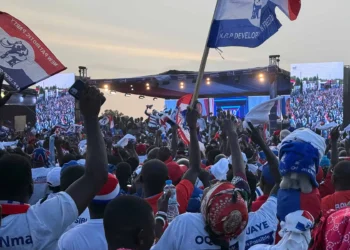The violence that marred the Ablekuma North rerun election has drawn fierce criticism from former Ghanaian Ambassador to the Netherlands, Dr. Tony Aidoo, who questioned both the role of the police and the democratic direction of the country.
His concerns extended beyond the day’s unrest to the very fabric of Ghana’s multi-party democracy, warning that a pattern of electoral violence continues to erode public confidence in the nation’s democratic experiment.
Dr. Aidoo expressed dismay over what he described as a troubling lack of intervention by the Ghana Police Service during the chaotic scenes that unfolded at the Ablekuma North rerun. “You can’t earn the trust of citizens by behaving that way,” he said.
His remark called into question the role of state security institutions during elections and highlighted a wider perception of institutional complicity or incompetence when violence erupts during politically sensitive periods.
Beyond the day’s violence, Dr. Aidoo lamented the narrow interpretation of democracy that he believes has taken root in Ghana since the beginning of the Fourth Republic.

“We seem to have defined our democracy in such limited terms that it finds expression in only successive elections. Beyond that, what else? Do the common people reap benefits from our democracy?”
Dr. Tony Aidoo, former Ghanaian Ambassador to the Netherlands
According to him, rather than being a tool for empowerment and development, Ghana’s democratic process has become a revolving door for a privileged elite, offering little tangible benefit to ordinary citizens.
He argued with cutting cynicism that the political system perpetuates a cycle where political cohorts alternate in power every eight years, with the end result being the same: personal enrichment of the ruling class.
Persistent Lawlessness
Reflecting on his time in the consultative assembly that crafted the 1992 Constitution, Dr. Aidoo said he had warned against blindly copying systems that work in other countries.
He argued that “systems which have worked somewhere else will not necessarily work in a different environment.”

Dr. Aidoo believes this misapplication has produced a democracy that, in practice, fails to serve the common Ghanaian. Instead, it has incubated a pervasive culture of lawlessness cutting across political, civil, and religious institutions.
“Lawlessness seems to be the characteristic feature of Ghanaian society. There’s hardly any facet of our country’s endeavor and behavior that is not characterized by lawlessness”
Dr. Tony Aidoo, former Ghanaian Ambassador to the Netherlands
Dr. Aidoo argued that this lawlessness is visible not just among civilians and politicians, but also within the police, military, churches, and public service. He decried the widespread “sycophancy” that sees allegiances shift wholesale from one regime to the next, instead of being rooted in constitutional duty to the country.
“If you are a public and civil servant, you don’t owe the new regime anything beyond your constitutional duties,” he stated.
Historical Pattern of Electoral Violence
The recent violence in Ablekuma North, according to Dr. Aidoo, is not an anomaly but part of a troubling historical trend that stretches back to the inception of the Fourth Republic.

“It represents a historical phase that appears to be persistent,” he said, recalling the 1992 killing of an NDC chairman at Effia-Kwesimintsim, which was blamed on an internal party dispute, and the 1996 murder of Emmanuel Graponi, an NDC activist who was reportedly beaten to death by NPP affiliates.
“Since then, it seems every election, especially by-election, attracts one violence or another. And I begin to wonder whether this democracy is worth it”
Dr. Tony Aidoo, former Ghanaian Ambassador to the Netherlands
Dr. Aidoo closed with a sobering reflection, questioning the value of Ghana’s democracy when the very people who participate and suffer most during elections, and all its attendant issues, especially violence, appear to gain the least from its outcomes in the long run.
With these reflections, the events at Ablekuma North are not merely a blip in the electoral calendar – they are part of a deeper crisis facing Ghana’s democratic future.




















